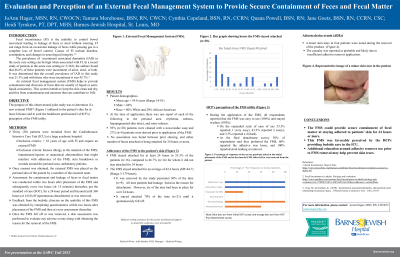Clinical Research
(CR-014) Evaluation and Perception of an External Fecal Management System to Provide Secure Containment of Feces and Fecal Matter

Introduction: Fecal incontinence (FI) is the inability to control bowel movements resulting in involuntary loss of liquid/loose feces. FI ranges from occasional leakage of feces while passing gas to complete loss of bowel control. Causes of FI include diarrhea, constipation, and changes in neurological integrity. FI can lead to incontinence associated dermatitis (IAD). An external fecal management system (FMS) contains and diverts feces keeping the skin clean, dry, and free from contaminants and moisture that contribute to IAD. The purpose of this study was to determine if a new FMS adhered to the patient’s skin for at least 24 hours and to seek the healthcare professional’s (HCP’s) perception of the FMS utility.
Methods:
Methods: Thirty (30) Intensive Care Unit patients were enrolled in an observational pilot study. Upon placement, the HCP assessed the patient every two hours for the FMS’s ability to control leakage until the device was removed/detached (or until 360 hours). The HCP also provided feedback on the usability of this device.
Results:
Results: The mean age of the patients was 58.97 years (range 18-81) with 60% (n=18) being males. The device stayed attached for at least 24 hours in 53.3% (n=16) of patients with an average attachment of 42.37 hours (range 3-179 hours). The FMS stayed attached 70% of the time (n=21) until it spontaneously fell off. It was removed by the HCP 30% of the time (n=9). All nine had leakage listed as the reason for detachment. Six of the nine had been in place for over 24 hours. Minor skin tears were reported on four patients upon removal of the FMS. Insufficient use of adhesive remover may have led to skin tears with removal. Survey results showed that 100% of the HCP’s thought the device was easy to use and initially stayed in place.
Discussion:
DISCUSSION: The results of this pilot study demonstrated that the FMS could provide secure containment of fecal matter by staying adhered to patients’ skin for 24 hours or more and that it was favorably perceived by the HCP’s. Additional education around adhesive remover use prior to device removal may help prevent skin tears.
Trademarked Items:
References:

.png)